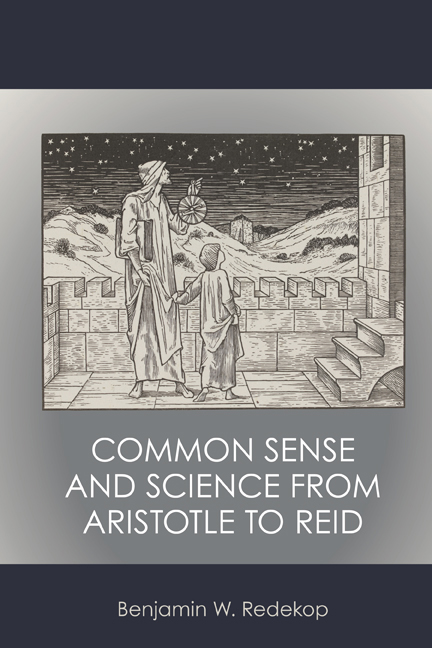Book contents
- Frontmatter
- Contents
- Acknowledgments
- Introduction
- 1 Common Sense and Scientific Thinking before Copernicus
- 2 The Challenge of Modern Science and Philosophy
- 3 Common Notions, Sens Commun: Herbert of Cherbury and Renè Descartes
- 4 Hobbes, Locke, and Innatist Responses to Skepticism and Materialism
- 5 Common Sense in Early Eighteenth-Century Thought
- 6 Common Sense and Moral Sense: Buffier, Hutcheson, and Butler
- 7 Common Sense and the Science of Man in Enlightenment Scotland: Turnbull and Kames
- 8 Common Sense, Science, and the Public Sphere: The Philosophy of Thomas Reid
- Epilogue
- Notes
- Index
2 - The Challenge of Modern Science and Philosophy
Published online by Cambridge University Press: 07 November 2020
- Frontmatter
- Contents
- Acknowledgments
- Introduction
- 1 Common Sense and Scientific Thinking before Copernicus
- 2 The Challenge of Modern Science and Philosophy
- 3 Common Notions, Sens Commun: Herbert of Cherbury and Renè Descartes
- 4 Hobbes, Locke, and Innatist Responses to Skepticism and Materialism
- 5 Common Sense in Early Eighteenth-Century Thought
- 6 Common Sense and Moral Sense: Buffier, Hutcheson, and Butler
- 7 Common Sense and the Science of Man in Enlightenment Scotland: Turnbull and Kames
- 8 Common Sense, Science, and the Public Sphere: The Philosophy of Thomas Reid
- Epilogue
- Notes
- Index
Summary
Modern science was founded in part on a distrust of ordinary sense experience and “appearances” in favor of corpuscular, idealized, and mathematical truths. The world of everyday experience needed to be reexamined, tested, transcended, put on the rack, and reduced (at least in theory) to invisible forces and minute particles in order to be understood. The writings of early-modern philosophers like Descartes, Hobbes, Locke, and Hume, who were deeply influenced by the discoveries and methodologies of modern science, exhibited this perspective, and the long-term effect was to place into doubt much that seemed to be self-evidently true and spontaneously known.
The first major event in this story was the advent of Copernicanism. There was no more significant and far-reaching challenge to the common-sense underpinnings of scientific thought and practice than the idea that the earth moves in a double motion around the sun—an idea which labored under the burden of contradicting Scripture as well. The challenge to Scripture, and with it the medieval Christian worldview and power structure, often receives the most attention in discussions of the travails of Copernicanism. But as both Calvin and Galileo recognized, if there was a discrepancy between science and Scripture on astronomical questions, that was because the Scriptural writers had been addressing the common folk, on their own terms, about salvation and were not trying to teach them astronomy. Thus although religious concerns and controversies were clearly central to the way in which Copernicanism and the new physics that went with it were received, there can be little doubt that Copernicanism exemplified the challenges posed by modern science to common-sense experience, even as sense experience itself began to assume an authority that it had not held since Aristotle.
Copernicus himself realized the absurdity of his proposal, noting that it was “in opposition to the general opinion of mathematicians and almost in opposition to common sense [communem sensum] [that] I should dare to imagine some movement of the earth.” Here, Copernicus employs the term “common sense” to signify basic sense perceptions shared by everyone, as opposed to more abstruse mathematical knowledge. Copernicus's early Polish defender Barholomew Keckermann (d. 1609) argued that “ ‘Everything indicates that the movement of the Earth as assumed by the greatly famed Copernicus must not be regarded as a realistic term but as an astronomical working term.’ “
Information
- Type
- Chapter
- Information
- Common Sense and Science from Aristotle to Reid , pp. 21 - 32Publisher: Anthem PressPrint publication year: 2020
